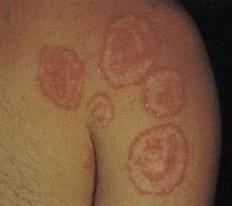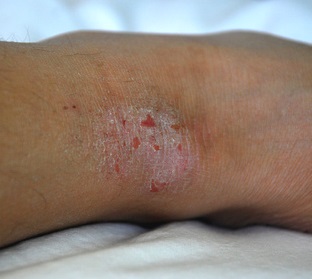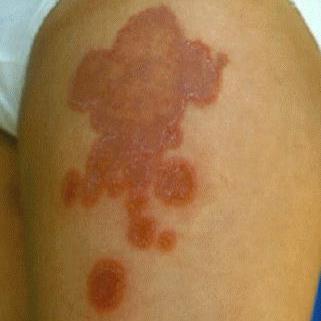
If you’ve got a skin condition and are wondering if it’s ringworm or eczema, you’ve come to the right place. Of course, for a 100% accurate diagnosis, you should see a doctor find out if you’ve got eczema or ringworm. We can tell you what each condition looks like, though, and also show you some pictures of both ringworm and eczema to help you figure out what you’re dealing with. We can also tell you how both conditions are treated.

Is it Ringworm or Eczema?
While there are some similarities between the two conditions, there are many differences, too.
Ringworm – Despite the name, ringworm isn’t caused by a worm. It’s a type of fungus, the same type that causes athlete’s foot and jock itch, in fact. The name comes from the appearance of the condition, a red ring around a white center of scaly skin. Ringworm usually isn’t painful but it can be extremely itchy and uncomfortable.
Eczema – While doctors aren’t sure exactly what causes eczema, they do know it’s not caused by any kind of fungus. It’s thought to be a combination of dry, irritable skin and some sort of disorder or malfunction of the immune system. Eczema causes scaly patches of skin, but unlike ringworm, these aren’t round or ring-like in appearance. Patches of eczema are red or brownish in color and may ooze or bleed, especially if you scratch the area a lot. Eczema is not just itchy, it can be pretty painful, as well.
Ringworm has a pretty distinctive appearance. You’re not likely to mistake it for something else.
Eczema, on the other hand, looks a bit like some other skin conditions, including, psoriasis, so it may be harder to determine if that’s what you’re dealing with. Eczema frequently begins in childhood, often before the age of five, so if you’re dealing with a skin condition that started in adulthood, it may be something else. Eczema can appear anywhere on the body but it’s most commonly seen on the hands and feet, the bend of the elbow and the bend behind the knee, the face, neck, and upper chest. According to the Mayo Clinic, it may improve for a while, then get worse again, seeming to come and go over time.
When trying to determine if you’ve got ringworm or eczema, one other factor to consider is the fact that ringworm is contagious. Eczema is not. If other members of your household are suffering from the same skin problem, it’s probably not eczema.
If you’re not certain what skin condition you’re dealing with, see your doctor. He or she can probably make a diagnosis just by looking at the affected area, but if not, ringworm can be diagnosed by examining a skin scraping from the area.
 |  |
How do You Treat Ringworm or Eczema?
It’s important to know if you’re dealing with eczema or ringworm because the two conditions are treated very differently. While ringworm can be cured with proper treatment, there is no cure for eczema. With treatment, your eczema symptoms can be managed but they might flare up again at any time. The treatments that can control your eczema symptoms won’t cure ringworm, though, and without proper treatment, not only will ringworm continue to plague you, you can spread the condition to others.
Ringworm is caused by a fungus, so it must be treated with antifungal medication or by natural treatments with antifungal properties. Here is more information on ringworm treatment. Antifungal treatments will do nothing for eczema, however.
Eczema is sometimes treated with prescription medications, like steroids to reduce inflammation or drugs to boost the immune system. Some people prefer to treat eczema naturally, though, and often the need for prescription drugs can be avoided. One natural treatment we really like is Wild Naturals Eczema and Psoriasis Moisturizing Skin Cream, which soothes dry, itchy, irritated skin and relieves discomfort associated with eczema. To learn more about our favorite natural eczema treatment, just follow the link.
Mayo Clinic: Eczema
